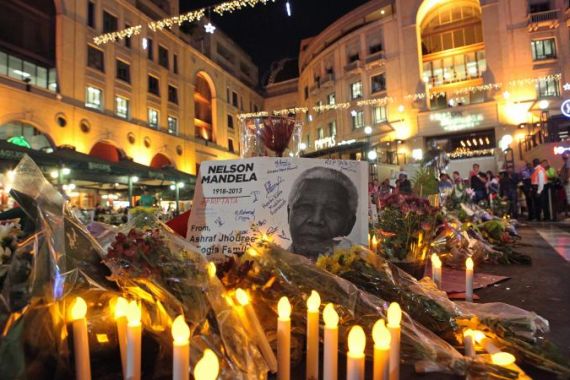Going home to bury Madiba
The hurt of knowing the country will be left with less than below average leaders is momentarily terrifying

Johannesburg, South Africa – It is with some trepidation that I return home to report on the passing of Mandela.
This is not the story I wanted to ever report on, even if it’s the story I thought about even years before I became a journalist.
Hours before the official announcement, friends back home passed on information gathered through the grapevine. Despite the South African presidency’s best efforts to keep a lid on the comings and goings of Chez Mandela, there has always been someone’s uncle who knows someone else’s uncle who knows someone inside the household.
Throughout the last year, various rumours of Mandela’s death – and an imminent white genocide – proliferated.
I chose to ignore the latest rumour.
Last year, I received a message from a friend of a friend who knew a former nanny of the Mandela family: The old man was dead and the presidency was waiting for an appropriate time to announce the story.
I believed it could be true, but let it be. I was in no rush to kill him.
Quite frankly, the number of times this man has died over the last 24 months is startling, almost torturous. And my interest in covering “the story” diminished further with every rumour, with every jolt.
Even before the fact, Mandela’s death had turned into another product to download, share, consume.
But his passing means a lot for South Africa and it’s people.
This a new nation, fathered by Mandela, and even if the country is just a step away from adulthood, the hurt of knowing the country will be left with less than below average leaders to take them forward is momentarily terrifying.
South Africans however have been alone for a long time. His disappearance from public life in 2004 was preparation for this day.
Outside South Africa, the rest of the world claims he meant a lot to them too. He is considered the last of the 20th century’s greatest icons.
This global reverence however is rather incongruent considering apartheid was reasonably legitimate in the eyes of the powerful – until it started imploding.
What we do however know for sure is that from Gaza to Kashmir, other subjugated people look upon Mandela with an intense reverence.
Other liberation movements have read his books, detailed his plight and aren’t foolhardy enough to believe his was exclusively a non violent struggle from start to end.
Mandela was not a natural born killer, but neither was he prepared to renounce violence against a state that proved uninterested in negotiation.
He got his hands dirty, and went on to question the legitimacy of the then South African state for its draconian laws, and become commander-in-chief of the armed wing of the ANC.
It would appear, given the praise heaped on him today, Mandela’s resilience meant a great deal more to the nations and people under the hammer than the presidents, people and the privileged in countries who supported apartheid, or didn’t think much of it, until ignorance or avoidance suited them no longer.
Imperfections in judgement
Leaving the politics of praising Mandela aside, Mandela was by no means a perfect man. He was not a saint.
His imperfections in judgement have been detailed, even as his stature has necessitated that for an over arching narrative to dictate, a type of modern sainthood.
But further probing is bound to arise in the shadow of his death more truths of the fine print behind reconciliation are bound to leak.
And the generally accepted narrative of South Africa’s transition may be exposed as a murky myth, rather than a modern-day miracle.
“When Mandela goes” has always been the big question in this country, and for others outside, convinced that a bloodbath is the only natural consequence.
But as I travel home, I know that the value-judgement that drives the motif of this question has long passed.
The xenophobic attacks of 2008, the brutality of the Marikana massacre, the everyday event of pitiful service delivery strikes in townships across the country has reminded us that the old struggle never went away.
The question now is what kind of adult South Africa wants to be.